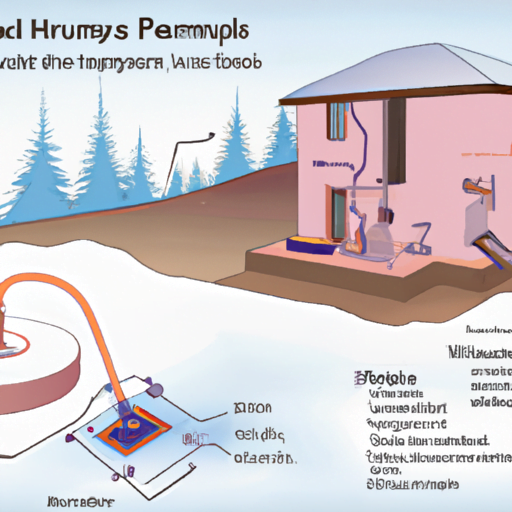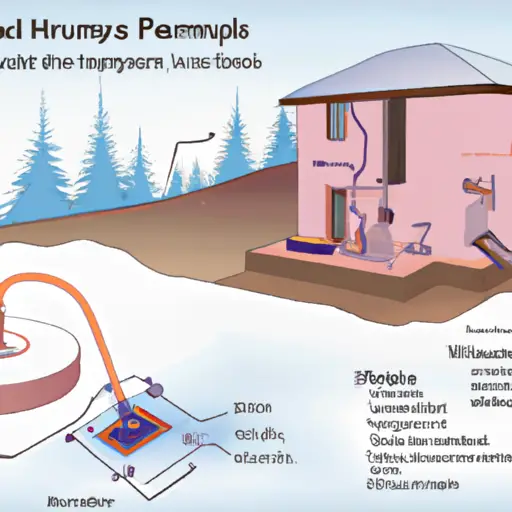So, you’re interested in off-grid living? That’s awesome! There’s something truly liberating and sustainable about living off the grid, isn’t there? But here’s the thing – one of the main challenges of off-grid living is finding a reliable and efficient heating solution for your house. That’s where heat pumps come in! In this article, we’re going to explore whether a heat pump can efficiently heat an off-grid house and how it can be a game-changer for your sustainable lifestyle.
Now, the idea of using a heat pump to heat your off-grid home might seem a bit unconventional at first. After all, when you think of heat pumps, you probably picture them in more traditional, grid-connected homes. But guess what? Heat pumps can absolutely be used off the grid too! In fact, they can be a highly efficient and effective heating solution for off-grid homes, helping you stay warm and cozy all year round.
With their ability to extract heat from the surrounding air, ground, or water, heat pumps can efficiently convert this heat into usable energy to heat your home. This means that even when you’re living in a remote location without access to traditional power sources, a heat pump can still provide you with the warmth you need. Of course, there are some factors to consider, such as the size and insulation of your home, as well as the specific type of heat pump you choose. We’ll dive deeper into all of these details in the article, so you’ll have a better understanding of how to make a heat pump work for your off-grid living needs.
So, if you’re intrigued by the idea of using a heat pump to efficiently heat your off-grid house, you’re in the right place! In the rest of this article, we’ll explore the benefits, considerations, and potential challenges of using a heat pump in an off-grid setting. By the end, you’ll have a comprehensive understanding of whether a heat pump is the right heating solution for your sustainable off-grid lifestyle. So, let’s get started and dive into the world of heat pumps and off-grid living – trust me, you won’t want to miss it!

Introduction
Off-grid living is a lifestyle that involves living in a self-sustainable manner, without relying on public utilities such as electricity and water supply. It is becoming increasingly popular as people seek to reduce their environmental impact and become more self-sufficient. One of the key challenges of off-grid living is finding an efficient and reliable heating system for the house. In this article, we will explore whether a heat pump can efficiently heat an off-grid house.
What is Off-Grid Living?
Definition of Off-Grid Living
Off-grid living refers to living in a manner that is completely independent from public utilities. This means generating your own electricity, sourcing your own water, and managing your waste without relying on external services. Off-grid living often involves the use of renewable energy sources such as solar panels, wind turbines, and hydroelectric systems.
Benefits and Challenges of Off-Grid Living
Off-grid living offers several benefits, including reduced reliance on fossil fuels, lower utility bills, and increased self-sufficiency. It allows individuals or communities to have more control over their energy usage and reduce their carbon footprint. However, off-grid living also presents challenges, such as the initial cost of setting up a self-sustainable system and the need for proper planning and maintenance to ensure a continuous supply of energy and water.
Understanding Heat Pumps
Definition and Working Principle of Heat Pumps
A heat pump is a device that transfers heat from one place to another using a small amount of energy. It works on the principle of extracting heat from a cold source and transferring it to a warmer area, thus providing heating or cooling depending on the desired outcome. Heat pumps are commonly used for residential heating and cooling, as they are highly efficient and can provide energy savings compared to traditional heating systems.
Types of Heat Pumps
There are several types of heat pumps available, including air-source, ground-source (geothermal), and water-source heat pumps. Air-source heat pumps extract heat from the air, while ground-source heat pumps extract heat from the ground or a water source. Each type has its own advantages and disadvantages, depending on factors such as climate, installation location, and available resources.
Efficiency of Heat Pumps
Heat pumps are known for their high efficiency, as they can provide more heat energy than the electrical energy they consume. The efficiency of a heat pump is usually measured by its coefficient of performance (COP), which represents the ratio of heat output to the electrical energy input. Heat pumps with higher COP values are more efficient and can save more energy and money over time.

Heating Options for Off-Grid Houses
Traditional Heating Systems
Traditional heating systems, such as oil or gas-fired furnaces, have been commonly used in off-grid houses. These systems require a constant supply of fuel and can be expensive to operate, especially in remote areas where fuel delivery may be challenging. They also contribute to carbon emissions and are not considered environmentally friendly.
Renewable Heating Systems
Renewable heating systems are an ideal choice for off-grid houses, as they rely on renewable energy sources and have minimal impact on the environment. These systems include solar thermal panels, biomass boilers, and heat pumps, among others. Among these options, heat pumps are particularly advantageous due to their high efficiency and ability to extract heat from the environment.
Advantages and Limitations
Using a heat pump for off-grid heating offers several advantages. Firstly, heat pumps are highly energy-efficient, as they can provide up to 4 times more heat energy than the electrical energy they consume. This results in significant energy savings and lower utility bills. Secondly, heat pumps produce fewer carbon emissions compared to traditional heating systems, making them a greener choice. Lastly, heat pumps require minimal maintenance and have a long lifespan, providing long-term cost-effectiveness.
However, there are some limitations to consider when using heat pumps for off-grid heating. Firstly, heat pumps require a reliable power supply to operate, which may pose a challenge in off-grid locations. Additionally, extreme climate conditions, such as extremely low temperatures, can reduce the efficiency of heat pumps. Finally, proper house insulation and energy-efficient design are crucial to maximize the performance of heat pump systems.
Can a Heat Pump Alone Heat a House?
Heat Pump as a Sole Heating Source
Yes, a heat pump can efficiently heat a house as a sole heating source. Heat pumps are designed to provide heating even in colder climates, and advancements in technology have made them more efficient than ever. However, the efficiency and effectiveness of a heat pump in heating a house will depend on several factors, including the climate, the size and insulation of the house, and the heat pump’s capacity.
Factors Affecting Heat Pump Performance
Several factors can affect the performance of a heat pump in heating a house. Firstly, the outdoor temperature plays a crucial role in determining how efficiently a heat pump can extract heat from the environment. As the outdoor temperature drops, the heat pump’s ability to extract heat decreases. Secondly, the size and insulation of the house are important considerations. A well-insulated and properly-sized house will require less energy to heat, allowing the heat pump to operate more efficiently.
Calculating Heat Pump Capacity
To ensure that a heat pump is capable of efficiently heating a house, it is essential to calculate its heating capacity. This involves considering factors such as the size of the house, the insulation levels, and the desired indoor temperature. A professional heating contractor can accurately calculate the required heat pump capacity to ensure optimal performance.
Benefits of Using a Heat Pump for Off-Grid Heating
Energy Efficiency
One of the primary benefits of using a heat pump for off-grid heating is its high energy efficiency. Heat pumps can provide up to 4 times more heat energy than the electrical energy they consume, resulting in significant energy savings. This is especially advantageous in off-grid settings where energy conservation is crucial.
Reduced Carbon Emissions
Using a heat pump for off-grid heating also significantly reduces carbon emissions compared to traditional heating systems. Heat pumps utilize renewable energy sources and do not burn fossil fuels, making them a greener choice. This helps individuals and communities reduce their environmental impact and contribute to a more sustainable future.
Cost-effectiveness
Heat pumps offer long-term cost-effectiveness for off-grid heating. Although they may have a higher upfront cost compared to traditional heating systems, the energy savings and lower utility bills over time can offset this initial investment. Additionally, heat pumps require minimal maintenance and have a long lifespan, further reducing long-term costs.
Challenges and Considerations
Climate and Temperature Extremes
One of the main challenges of using a heat pump for off-grid heating is extreme climate conditions. Heat pumps rely on extracting heat from the environment, and extremely low temperatures can limit their efficiency. In colder climates, additional heating sources or backup systems may be necessary to ensure optimal heating during temperature extremes.
Power Supply and System Reliability
For off-grid houses, a reliable power supply is essential for the operation of a heat pump. This can be a challenge in remote locations or during power outages. It is important to have backup energy sources or a reliable off-grid power system to ensure continuous heating even during power disruptions.
House Insulation and Energy Efficiency
Proper house insulation and energy-efficient design are crucial considerations when using a heat pump for off-grid heating. A well-insulated house will require less energy to heat, allowing the heat pump to operate more efficiently. Additionally, energy-efficient design features such as double-glazed windows and good ventilation can further enhance the performance of the heat pump system.
Alternative Heating Methods for Off-Grid Houses
Wood Stoves and Fireplaces
Wood stoves and fireplaces have long been used as heating sources for off-grid houses. They provide a cozy and traditional ambience, but they also require a constant supply of firewood and can contribute to air pollution if not properly managed. Wood stoves and fireplaces can be used in combination with heat pumps to provide additional heating during extremely low temperatures.
Solar Thermal Heating Systems
Solar thermal heating systems use the sun’s energy to heat water or air, which can then be used for heating purposes. These systems typically consist of solar panels or collectors that capture sunlight and convert it into heat. Solar thermal heating systems are a renewable and environmentally friendly option for off-grid houses, but they may not be sufficient as a sole heating source in colder climates.
Geothermal Heating Systems
Geothermal heating systems utilize the constant temperature of the earth to provide heating and cooling. These systems involve burying pipes underground to capture the earth’s heat and transfer it to the house. Geothermal heating systems are highly efficient and environmentally friendly, but they require a significant upfront investment and may not be suitable for all off-grid locations.
Case Studies of Off-Grid Houses using Heat Pumps
Success Stories of Heat Pump Usage
There have been numerous success stories of off-grid houses effectively using heat pumps for heating. These include houses in remote mountainous areas, coastal regions, and even arctic climates. With proper insulation, sizing, and backup systems, heat pumps have proven to be reliable and efficient in providing heating for off-grid properties.
Lessons Learned and Recommendations
Based on these success stories, there are several lessons learned and recommendations for using heat pumps in off-grid houses. Firstly, it is crucial to properly size and insulate the house to maximize the heat pump’s performance. Secondly, having backup heating sources or systems in place can ensure heating continuity during extreme weather conditions or power outages. Finally, regular maintenance and monitoring of the heat pump system are essential to ensure optimal performance and longevity.
Conclusion
In conclusion, a heat pump can efficiently heat an off-grid house as a sole heating source. Heat pumps are highly energy-efficient, environmentally friendly, and cost-effective, making them an ideal choice for off-grid living. However, it is important to consider factors such as climate, power supply, system reliability, and house insulation when using heat pumps for off-grid heating. With proper planning, sizing, and maintenance, heat pumps can provide reliable and efficient heating for off-grid houses, contributing to a sustainable and self-sufficient lifestyle.




